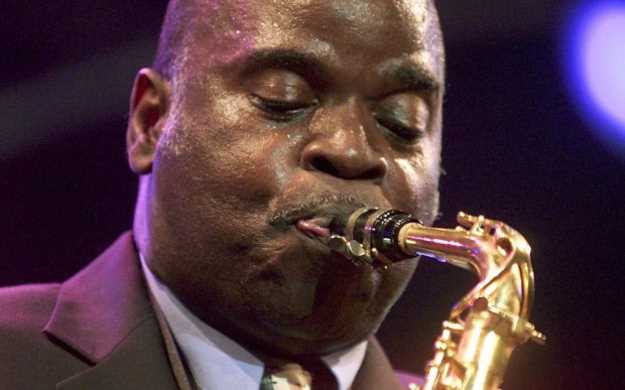|
Taken from Twin Cities (June 12, 2019)
Saxophonist Maceo Parker covers all the bases with high-energy Dakota show
by Dan Emerson, Special to the Pioneer Press

Jazz saxophonist Maceo Parker (Laurent Gillieron / Associated Press) |
If the music industry had a Sideman Hall of Fame, 76-year-old saxophonist Maceo Parker would undoubtedly be a member.
Parker, who led his septet at the Dakota on Tuesday night in Minneapolis, played invaluable, influential roles in bands led by R&B titans James Brown, George Clinton and Prince. He's considered one of the major architects of funk music. But he's also very experienced as a bandleader, first as leader of the 1970s Brown spin-off group, Maceo and All the King's Men, and since then at the helm of his own, mostly instrumental jazz-funk combos.
The training he received as a young member of Brown's rhythmically precise bands has become part of his musical DNA. He's still very rhythm-oriented, and his saxophone riffs seem to wrap around the beats laid down by the band's expert drummer, Pete MacLean.
Maceo has played the Dakota before, but this time the soundman seemed to be having problems getting a listener-friendly mix and volume in the room, which is probably a smaller venue than many the band plays. At times, the instruments sounded like cacophony and feedback was a problem, off-and-on, during the opening set.
But the music was, as always, very tight in the JB tradition and somewhat varied with elements of jazz and soul balladry along with the funk.
After starting with a driving funk instrumental, Parker segued into a brief tribute to his former boss, Clinton, with "Make My Funk the P-funk," and then a few verses of Sly Stone's 1970's piece "In Time."
Rapping to the audience, Maceo made light of the fact that while the Dakota is known as a jazz room, his band is mainly designed for the funk. He humorously ripped through a well-played but accelerated rendition of Duke Ellington's "Satin Doll," backed only by Will Boulware's organ.
Then the band, attired in matching purple shirts - probably as a tribute to Maceo's one-time bandleader Prince - launched into another '70s Brown anthem, "Make It Funky," with Maceo quoting the melody from "Down by the Riverside," and then rapping to the audience. The backbeat-and bass-driven funk rhythms were as infectious as ever.
Parker also did some impressive flute playing on an instrumental ballad. Then the rest of the band took a break as trombonist Greg Boyer did some beautifully lyrical playing in a duet with Boulware, on the jazz standard "Secret Love."
A novel, up-tempo funk arrangement of Jerry Leiber and Phil Spector's "Spanish Harlem" followed, with Maceo throwing in a quote from Horace Silver's "Blowin' the Blues Away." Then Maceo honored the late Marvin Gaye with "Let's Get It On," segueing into a glove-tight rendition of Brown's "I Got the Feeling."
Parker also does a very credible vocal impression of the late Ray Charles, which has become a regular part of his show. He donned wraparound shades and smoothly crooned the Charles ballad lament, "You Don't Know Me."
Then the band laid down some infectious New Orleans funk with the Meters' street parade anthem "Hey Pocky Way." The band's other vocalist - Maceo's cousin Marlene Parker - took the spotlight with an energetic, gospel-tinged version of Ben E. King's "Stand By Me."
The set climaxed with Brown's irresistible "Funky Good Time," with Maceo tacking on a "Somewhere Over the Rainbow" coda, before the band launched into one of JB's old instrumental hits, "Pass the Peas."
The septuagenarian Parker showed admirable energy throughout the set, throwing in a few dance steps and blowing his gold-plated Selmer saxophone with gusto.
|